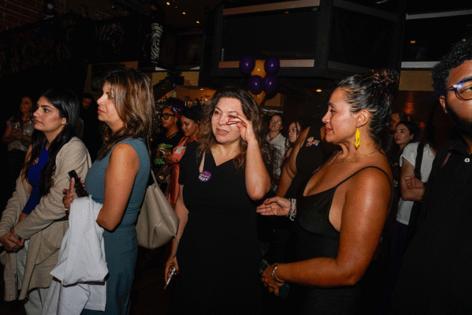Florida's abortion Amendment 4 failed. What to know now
Published in Political News
TAMPA, Fla. — Despite millions of dollars poured into ads and other voter outreach, a proposed constitutional amendment that would have protected abortion access in Florida failed Tuesday.
Amendment 4, backed by a coalition of groups supporting abortion access, received about 57% of the vote, short of the necessary 60% to pass.
The amendment was opposed by Gov. Ron DeSantis, who leaned on the power of state government to fight it. Its failure means that the state’s ban on most abortions after six weeks of pregnancy, which DeSantis signed into law last year, will continue.
Here’s what to know about abortion in Florida after Amendment 4 failed.
What is Florida’s abortion law?
Florida law bans the vast majority of abortions after six weeks of pregnancy.
Critics say that is before many women know they are pregnant. Weeks of pregnancy are generally calculated based on the first day of the pregnant woman’s last menstrual cycle. By the time a woman may have a missed period, she would already be considered about four weeks along.
Women seeking an abortion must have an in-person consultation at least 24 hours before the procedure. State law prohibits abortion medication from being mailed.
What about exceptions?
Victims of rape, incest or human trafficking can get an abortion up to 15 weeks. But a woman must provide some kind of documentation, like a police report, medical record or court order.
Florida also has exceptions to allow for abortions later into pregnancy to save the life or health of the mother. Two physicians need to sign off and say that an abortion is necessary to save a pregnant woman’s life or “avert a serious risk of substantial and irreversible physical impairment of a major bodily function.” Only one physician needs to sign off if it is an emergency.
A woman can also access an abortion for a fatal fetal abnormality if two physicians sign off, so long as the pregnancy has not entered the third trimester.
Why do Amendment 4 proponents say Florida’s exceptions don’t work?
The Amendment 4 campaign has called Florida’s current exceptions unworkable. They ran advertisements with a doctor who said the state’s abortion ban forces physicians to wait until women are on the brink of death to access an abortion.
They also ran ads featuring women like Anya Cook, a South Florida woman who ended up in intensive care and was denied an abortion after her water broke at 16 weeks, and Deborah Dorbert, a woman who had to carry her fetus to term despite knowing he would die shortly after birth.
Florida’s law makes it a third-degree felony, punishable by up to five years in prison, for any person who performs an abortion in violation of the law. Doctors have said working with the threat of criminal prosecution makes it harder to act swiftly.
Gov. Ron DeSantis has said the campaign’s assertions about the health exceptions not working are false and said if a doctor did not provide care, it would be malpractice.
Can minors get an abortion?
Floridians under 18 need notarized parental consent to get an abortion.
Minors seeking an abortion can get one without their parent’s permission if they petition a judge. The judge must determine that the minor is “sufficiently mature” to choose an abortion, weighing things like age, emotional development and ability to accept responsibility.
Judges are supposed to rule on a waiver within three business days after a petition is filed, and if they deny the abortion, the minor can appeal. The appellate court must then rule within seven days.
What about the Amendment 4 lawsuits?
In the lead-up to Election Day, both the Amendment 4 campaign and opponents filed a flurry of lawsuits.
In one lawsuit, the campaign behind Amendment 4 sued the Florida surgeon general after the state health department sent letters to TV stations that threatened criminal prosecution if they didn’t stop airing a pro-Amendment 4 ad.
A federal judge issued a temporary restraining order against the state in that case, saying officials were the First Amendment. That order is set to expire on Nov. 12, after the election, and it will be up to the judge to determine whether the issue is moot after Election Day.
Other lawsuits, filed by a group of anti-abortion activists, sought to remove Amendment 4 from the ballot or nullify it after the election because of alleged fraud. Those lawsuits leaned on a report from the DeSantis administration that said there was “widespread” fraud in the petition-gathering process.
The lawsuits were financially supported by an unnamed donor, and the plaintiffs are being represented by the former Florida Supreme Court justice Alan Lawson. Ahead of Election Day, Lawson said that if Amendment 4 failed, their case was moot and they would dismiss all of the lawsuits.
Can abortion access groups try again?
Groups in support of abortion access could come back and try to pass another amendment in another election cycle.
But it won’t be easy.
Florida lawmakers have made the ballot initiative process more difficult and expensive in the last few years, and DeSantis’ administration seems poised to make more changes that could again make the process harder to navigate .
©2024 Tampa Bay Times. Visit at tampabay.com. Distributed by Tribune Content Agency, LLC.




























































Comments